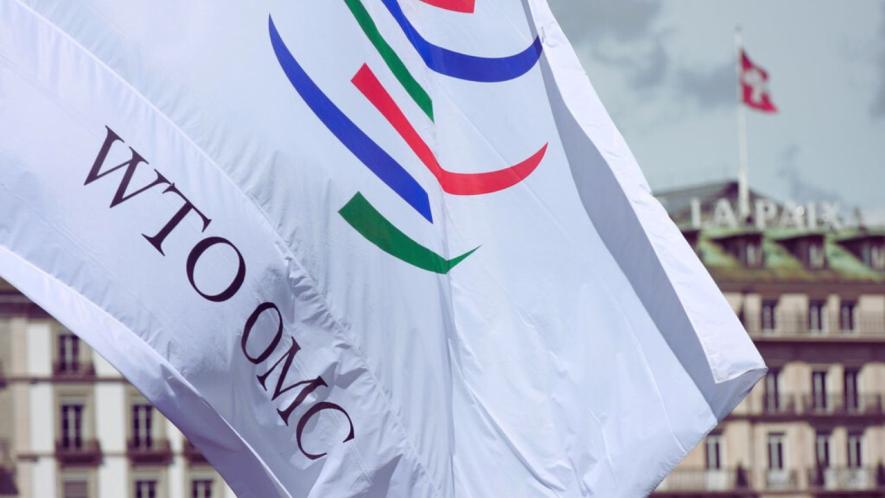High-Stakes, Global Battle Over Trump’s Tariffs

File Image
Trump’s “tariff war” is not an issue solely or even primarily about the US economy. It is an attempt to bring the entire world trading system under unilateral US control, removing any minimal element of multilateral negotiation from it.
In essence, the United States, despite accounting for only 11% of world trade and 4% of the global population, is demanding the right to unilaterally dictate the rules of global trade to the rest of the world.
If Trump succeeds in this effort, the consequences would be sweeping and deeply negative. Trade now constitutes 58% of global GDP, meaning that the livelihoods of more than 8 billion people would be directly affected by the outcome of this confrontation.
However, the numbers also show the objective weakness of Trump’s global position: 89% of global trade is not with the US. If other governments resist this pressure, Trump cannot succeed. He is, therefore, depending on the willingness of some governments to surrender their people’s and their national interests and capitulate to Washington’s demands. Unfortunately, based on past events, there is a danger that some governments may do exactly that. This makes it essential for people around the world, and for progressive and democratic forces, to understand what is at stake and to oppose this project.
The WTO system
It must be clearly emphasized: the current world trade system, embodied in the World Trade Organization (WTO), is itself fundamentally flawed and unjust. While the WTO formally operates on the principle of “one country, one vote”, in practice, trade deals are shaped by the major capitalist powers behind closed doors. Rich countries continue to shield their own industries with high tariffs in sectors where developing countries are competitive. They impose technical barriers, such as anti-dumping duties, to block exports from the Global South.
Multinational corporations – overwhelmingly headquartered in the Global North – have privileged influence within the WTO system. Progressive social and developmental policies are excluded from WTO decision-making. The TRIPS Agreement (Trade-Related Aspects of Intellectual Property Rights) prioritizes corporate profits over access to medicine and technology. The Agreement on Agriculture (AoA) allows chronic dumping of subsidized food exports from the Global North while failing to protect small farmers in the Global South, resulting in devastating crises such as farmer suicides in countries like India.
Despite these flaws, socialists and democrats have long understood that the choice is rarely between a good and bad system, but between a flawed system and something worse. Failing to recognize this can lead to grave mistakes.
In the meantime…
A classic example is the position toward capitalist democracy. While it is true that liberal democracy ultimately operates within the framework of capitalist domination – where private capital controls the economy, where media and elections are heavily dominated by wealth, and where military coups are used to overturn democratic systems if the rule of capital is challenged – progressive forces still recognize the need to defend parliamentary democracy against fascist or authoritarian threats. Lenin and Gramsci made this point clear during the earliest fights against fascism in Italy in the 1920s, confronting those on the left who failed to grasp this distinction.
Sometimes, alliances must even be made with imperialist powers. For instance, President Franklin D. Roosevelt was the leader of US imperialism, aiming to establish US global dominance, while UK Prime Minister Churchill was a racist and an antisemite, responsible for atrocities such as the 1943 Bengal famine. Yet the Soviet Union rightly allied with both the US and Britain to fight against the still greater threat posed by Nazi Germany and Japanese militarism. Progressive forces also supported such an alliance, and failing to make it would have been a catastrophic error.
Trump’s goal is not to reform or improve the current global trade system, fundamentally flawed though it is. He opposes it precisely because even its minimal multilateral rules constrain US dominance. His aim is to replace multilateralism with a system based solely on bilateral agreements in which the US can use its weight to dominate smaller partners individually.
Such a system would be a major regression even compared to the WTO. It would remove even the modest protections offered by multilateralism and replace them with arbitrary, US-dictated terms, vulnerable to sudden changes depending on Washington’s interests.
Mexico
A vivid example is Mexico. In 1992, Mexico entered a trilateral deal with the US and Canada – NAFTA. During his first term, Trump discarded NAFTA in favor of the USMCA, a deal more favorable to US interests. That agreement still allowed about half of Mexican exports to enter tariff-free, and many others faced only a 2.5% tariff. But in his second term, Trump declared this was still not favorable enough and imposed a 25% tariff on most Mexican goods not covered under USMCA. Canada faced similar treatment.
Trump’s model is clear: he wants a global trade regime where the US can change the rules at will, penalizing any country it deems too successful or politically inconvenient.
Given how clearly this undermines the interests of nearly every other country, one might assume all governments would resist such a system. And it is true that the US cannot impose this model unilaterally, given it accounts for just 11% of global trade. But experience shows that some governments do bow to US pressure, even at great cost to their own nations.
Europe is the largest and clearest case. Western European governments backed disastrous US policies such as NATO expansion, which led to the war in Ukraine. That war not only caused massive human suffering but also severed Europe’s energy ties with Russia, driving energy prices in Europe far higher and deeply damaging European economies and living standards. These decisions ran counter to Europe’s own economic, social, and geopolitical interests.
Mexico and Canada have announced that they will retaliate against US tariffs. China, the world’s largest trading nation, has declared that it will counter-sanction any country that, under US pressure, takes hostile trade measures against Chinese exports. President Claudia Sheinbaum of Mexico has publicly opposed US pressure and defended Mexico’s sovereignty. The results of the Canadian election also show strong opposition to subordination to US demands.
The understanding and resistance of the peoples of countries, demanding that their governments oppose these US actions, is crucial. The fight is not just about tariffs. It is about whether the future of world trade will be determined by a fundamentally flawed trade system, which requires drastic improvement, but which contains at least some minimal elements of multilateral negotiation and compromise, or one determined purely by unilateral US power. As so often in the past, but without any evasion, socialists must defend a fundamentally flawed system against one which is still worse.
John Ross is a senior fellow at Chongyang Institute for Financial Studies, Renmin University of China. He is also a member of the international No Cold War campaign organizing committee. His writing on the Chinese and US economies and geopolitics has been published widely online and he is the author of two books published in China, Don’t Misunderstand China’s Economy and The Great Chess Game. His most recent book is China’s Great Road: Lessons for Marxist Theory and Socialist Practices. He was previously director of economic policy for the mayor of London.
This article was produced by Globetrotter and No Cold War.
Courtesy: Peoples Dispatch
Get the latest reports & analysis with people's perspective on Protests, movements & deep analytical videos, discussions of the current affairs in your Telegram app. Subscribe to NewsClick's Telegram channel & get Real-Time updates on stories, as they get published on our website.
























